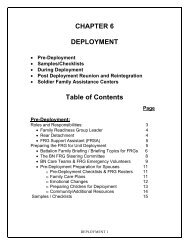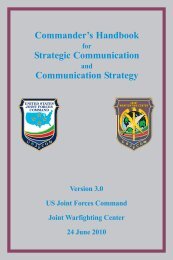A Leader's Guide to Trauma in the Unit - US Army War College
A Leader's Guide to Trauma in the Unit - US Army War College
A Leader's Guide to Trauma in the Unit - US Army War College
You also want an ePaper? Increase the reach of your titles
YUMPU automatically turns print PDFs into web optimized ePapers that Google loves.
<strong>Army</strong> <strong>War</strong> <strong>College</strong> Spouses’ Project<br />
3. After <strong>the</strong> death of a soldier, <strong>the</strong> military fulfills <strong>the</strong> roles of casualty notification and<br />
<strong>in</strong>terpret<strong>in</strong>g survivor benefits. In <strong>the</strong> event of a death of a spouse or child, <strong>the</strong> military<br />
role is more limited. You and o<strong>the</strong>r spouses represent <strong>the</strong> “heart” side of <strong>the</strong> unit, and<br />
that is where you can contribute (see Support section).<br />
4. Griev<strong>in</strong>g families have many questions regard<strong>in</strong>g survivor benefits and numerous<br />
o<strong>the</strong>r issues. Because you and o<strong>the</strong>r spouses <strong>in</strong> <strong>the</strong> unit provide support, families may<br />
look <strong>to</strong> you for <strong>the</strong> answers. When families have specific questions that require <strong>the</strong><br />
expertise of military personnel, do be a po<strong>in</strong>t of resource and referral. Refer families<br />
<strong>to</strong> <strong>the</strong> Casualty Assistance Officer (CAO), legal officer, chapla<strong>in</strong>, Public Affairs<br />
Officer (PAO), etc., when <strong>the</strong>y have questions. Also, do not try <strong>to</strong> answer <strong>the</strong><br />
question, “why?”<br />
5. Be careful <strong>to</strong> be an empathizer, ra<strong>the</strong>r than a sympathizer. In o<strong>the</strong>r words, show <strong>the</strong><br />
<strong>in</strong>volved family that you care, but don’t take on <strong>the</strong>ir feel<strong>in</strong>gs of grief. Be familiar<br />
with <strong>the</strong> Stages of Grief (see Appendix – Grief). This will help you <strong>to</strong> conserve your<br />
energy as a helper <strong>to</strong> <strong>the</strong> family and a leader of spouses <strong>in</strong> <strong>the</strong> unit. However, be<br />
aware that you may actually be griev<strong>in</strong>g this loss yourself and that <strong>the</strong> unit may be<br />
griev<strong>in</strong>g, <strong>to</strong>o. Members of <strong>the</strong> unit will be watch<strong>in</strong>g <strong>to</strong> see how <strong>the</strong> unit takes care of<br />
its family.<br />
6. Discuss with your spouse whe<strong>the</strong>r he/she will attempt <strong>to</strong> contact you when a critical<br />
<strong>in</strong>cident occurs while deployed.<br />
7. Consider speak<strong>in</strong>g with a trusted men<strong>to</strong>r or Chapla<strong>in</strong> if you experience feel<strong>in</strong>gs of<br />
fear, <strong>in</strong>adequacy or overwhelm. Do not be afraid <strong>to</strong> make mistakes.<br />
A death <strong>in</strong> <strong>the</strong> unit is an overwhelm<strong>in</strong>g experience. As a leader, you can play a vital role<br />
<strong>in</strong> <strong>the</strong> heal<strong>in</strong>g process by be<strong>in</strong>g yourself, be<strong>in</strong>g prepared and be<strong>in</strong>g focused on <strong>the</strong> family<br />
<strong>in</strong> need.<br />
________________________________________________________________________<br />
2<br />
A Leader’s <strong>Guide</strong> <strong>to</strong> <strong>Trauma</strong> <strong>in</strong> <strong>the</strong> <strong>Unit</strong> April 2004





